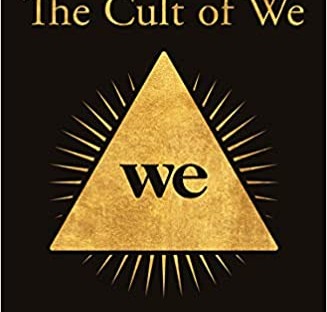Latest posts
A masterclass in creating value
What’s going on at parkrun?
Virtue-signalling all the way to the bank
Bud Light: brand purpose or virtue-signalling?
The Coddling of the American Mind, by Greg Lukianoff and Jonathan Haidt
Belonging, by Owen Eastwood
Such a simple thing
The Long Win, and The Scout Mindset
The Cult of We by Eliot Brown and Maureen Farrell
Coffee and covid modelling
By theme
Marketing strategy
Insight & metrics
Innovation & inspiration
Brand & positioning
Marketing communications
Business purpose
Leadership
By industry sector
Financial services
Retail
FMCG
Technology & start-ups
Consumer services
Business to business
Other sectors
By type
Books
Comment
Quotes
Thought leadership
This is a story of monumental hubris, greed and failure. The account of how the charismatic founder of WeWork, Adam Neumann, and his wife, Rebekah, drove the business into near-bankruptcy while extracting a billion dollars for themselves is a good read. The greed is not just theirs, though their hypocrisy is at times breath-taking. “We believe in this new Asset Light lifestyle” says Rebekah, after buying a $15m estate in Westchester, New York. This was not their first home; by the end they had eight. But this is also about how fear of missing out is a form of greed, and how FOMO can drive even experienced investors to suspend their usual judgement.
WeWork in its heyday was a modern landlord providing attractive office spaces occupied by start-ups and the professionals who advised them. It was a workplace full of optimists. There were coffee and water stations, airy reception areas full of light and comfortable sofas. I worked with a tech start-up whose London base was in a WeWork office near Blackfriars Bridge. It was a nice place to be. There was a good idea at the heart of WeWork – not original to the WeWork founders, but one which they drove at speed and scale. It could have been a sound, profitable, sustainable business, as demonstrated by Mark Dixon who founded Regus and achieved precisely that. He features in the book a couple of times, baffled by the valuations being achieved by WeWork, and curious to unpick its secret sauce. He eventually concluded there was none.
The biggest lesson of this book is that people love a story-teller. Neumann spoke loftily, and swept investors and employees along on his grand vision of making the workplace more enjoyable, and making work more worthwhile. As time went on his story and his vision became grander and more outlandish – elevating the world’s consciousness, solving world hunger. If this was a business with “purpose” it was purpose on hallucinogenics. The book shows how people who knew better let him have his way, time and time again, because it was easier than fighting with him. Perhaps they hoped he was right. More likely, they hoped to cash out before it became apparent there was no path to profitability, and it was all talk. In start-ups, putting growth before profit is an accepted approach, but usually because the underlying business is profitable, and generating more of it will result in economies of scale. This is true for software as a service, the most popular tech start-up model: finding new customers costs money but servicing them once signed up is cheap. WeWork was not a technology business. It had no economies of scale, so there was no point at which its rapid growth would secure future profitability. In this case VC investing, leading ultimately to flotation on the stock market, looks a lot like a Ponzi scheme.
We also see how competition is not the elixir for fairness and transparency that Adam Smith imagined. It’s competition between the US megabanks JP Morgan and Goldman Sachs that stops anyone telling Neumann the unpalatable truth as the IPO approaches. No one wants to miss out on the $100m fees for leading the IPO, so he gets away with increasingly unreasonable demands and behaviour that is almost unthinkable in the workplace – unless you’re everyone’s ticket to a multi-million payday.
But perhaps the most astonishing part is the epilogue: they’re all at it again. Despite the failed WeWork IPO, the subsequent collapse of other much-hyped start-ups like Nikola, and the dramatic fall in valuations of former tech darlings Juul and Uber, there is once again an appetite among investors for founders who talk big. Seemingly the lesson about the pursuit of growth at the expense of profit has not been learned.
Latest posts
A masterclass in creating value
What’s going on at parkrun?
Virtue-signalling all the way to the bank
Bud Light: brand purpose or virtue-signalling?
The Coddling of the American Mind, by Greg Lukianoff and Jonathan Haidt
Belonging, by Owen Eastwood
Such a simple thing
The Long Win, and The Scout Mindset
The Cult of We by Eliot Brown and Maureen Farrell
Coffee and covid modelling
By theme
Marketing strategy
Insight & metrics
Innovation & inspiration
Brand & positioning
Marketing communications
Business purpose
Leadership
By industry sector
Financial services
Retail
FMCG
Technology & start-ups
Consumer services
Business to business
Other sectors
By type
Books
Comment
Quotes
Thought leadership
